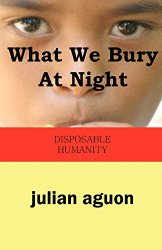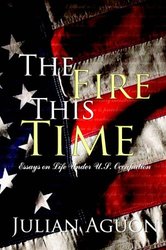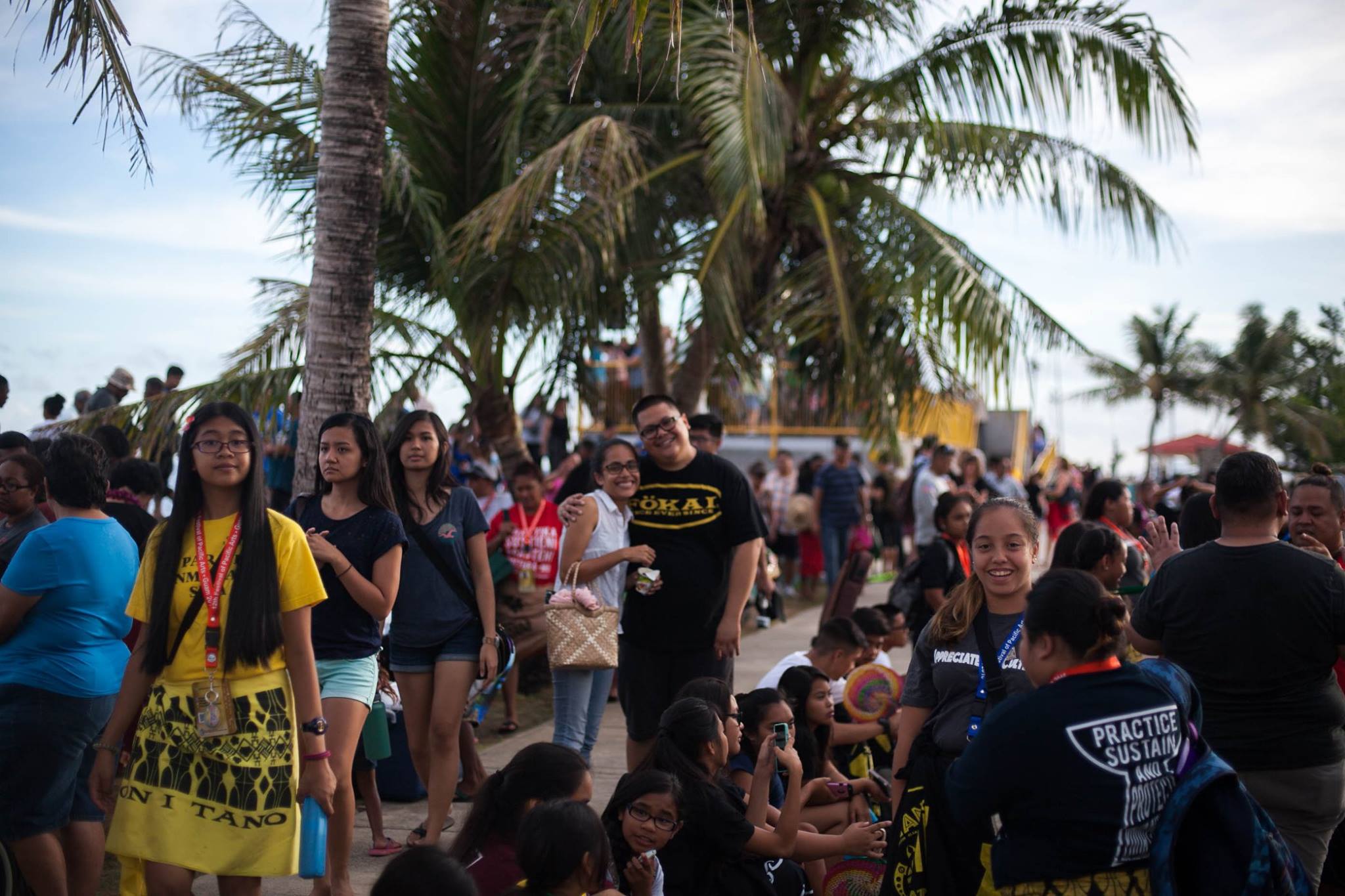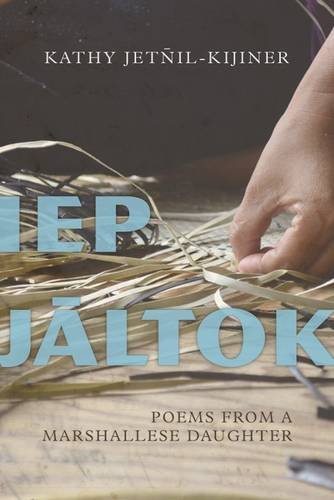More than seven years ago my mother emailed me asking if I knew the work of Julian Aguon, a Chammoro writer, activist, and United Nations recognized expert on international law. I didn’t – I had heard of his books, but my knowledge of his work stopped there. My mother happened to be hosting him during this period because her good friend is his aunty (of course – small island life, so many connections) and he was conducting research on the legacy of nuclear testing in Majuro. So when she wrote me, he was staying with my parents – and in my room no less.

Books by Julian available on Amazon

Books by Julian available on Amazon
We met about five or so years later and we were instantly good friends – based on our mutual love for our islands, our passion for justice in the pacific, and equally as important – our passion for each others’ work. Since that period he was in Majuro, he’s gone on to establish his own law firm, Blue Ocean Law, where he focuses on human rights issues in the Pacific (how bad ass is that?). Among other important work, they’ve just recently released a report on the risks and pitfalls of seabed mining for Pacific peoples. And at the recent Festival for Pacific Arts in Guam, his law firm organized a regional forum on human rights in the Pacific, where I was a speaker focusing on climate change (you can read more about that reflection here) and it was another great opportunity for us to connect, and of course admire each others’ latest work.

Where’s waldo version of me and Julian at the recent Festival of Pacific Arts in Guam PC: Katherine Mafnas
When my mother emailed me to ask if I knew of Julian, she attached the commencement speech he’d written for his graduating class at the Richardson School of Law in Honolulu. I opened it, not really expecting to get much out of it.
I ended up bursting into tears half way through.
No I wasn’t going through some fit of emotions (really) – it was just that well written. And it wasn’t just because of the sheer beauty of his words, but also because of how powerful and necessary his story was to mine.
When I read Julian’s speech I was in California, pursuing my undergrad in a sea of americans, with barely any islanders in sight. There was no tangible reminder of the islander culture I once held so close – at the time I hadn’t made any connections with the islander community (the closest was the marshallese community which was a three or four hour bus ride away), there were no classes on pacific literature (the closest was an asian american women’s literature course – don’t get me started on why that’s problematic), and books by islanders in the mills library was limited. My connection to the bay area islander community would all come much later (shoutout to Craig Santos Perez and One Love Oceania). In short, I was hungry for islander storytelling.
And although the speech itself is directed towards graduating law students in Hawai’i, so much of its message applies to those of us working and aspiring towards change, giving us, as the title indicates, a handful of lessons on saving the world. All while anchoring these lessons in a beautiful Chammoro legend.
At the time, I needed to read this. And after these past long couple of months of bad news, I needed to read it again. And it found its way to me. And it was/is so, so nourishing. I share it with you today (with permission from the author of course) and I hope it provides the same kind of inspiration for other readers that it gave me.
My Mother’s Bamboo Bracelets:
A Handful of Lessons on Saving the World
By Julian Aguon
A speech given at the Commencement Exercises of the William S. Richardson School of Law Honolulu, Hawai‘i May 17, 2009
Si Yu’us Ma’åse’ and thank you Chief Justice Richardson, deans, faculty, regents, alumni, friends, family and loved ones, for joining us tonight as we celebrate this year’s graduating class of our fine William S. Richardson School of Law.
Dear classmates:
Thank you. It is an honor to be able to share some of my thoughts with you on this beautiful evening.
I have thought of you so often in the last several weeks, as I have meandered the landscapes of my mind to figure out what I could possibly say that could be of use to you. You have no idea how much I’ve agonized over constructing my talk away from my usual bullets: human rights, self-determination, demilitarization. You’ll be impressed. I have, for the most part, succeeded. But, as a writer, I know that nothing of worth can be written that is not culled from the light of my own life. So bear with this writer-activist from Guam, as I relay twelve minutes worth of what I have come to know of the world. Hopefully, you can take something of what is imparted with you in the new morning. If not, feel free to throw it out a high window.
Despite what we’ve been told, the world is not ours for the taking. Indeed, the world we have inherited comes to us bruised, a tender shard of her former self, having passed clumsily through the well-intentioned hands of our mothers and fathers, seeking, seeking a generation it can trust enough, and long enough, to drop its shoulders.
Of the belief that love can save the world, I have a story to tell:
In the old days in the land now known as Guam, when the people lost their connection to their way, when the rains would not come and the people grew wild with hunger, a giant grouper fish determined to destroy Guam began to eat the island widthwise, one giant chunk after another. Day after day, the men of Guam tried to stop it. They pursued it with spears, tried in vain to trap it, to catch it with nets they had made. They called upon the ancestors to aid in the capture. Every day, the women of Guam offered to help catch the giant fish, and every day the men, forgetting the strength of women, rejected them. One night, while the women were weaving the pandanus leaves, the answer came to the maga’håga, the elder and leader among them. The women would weave a giant net from their long black hair. One by one, the women, old and young, came forward, knelt on the black stone, and parted with their beauty. Then they got to work, weaving and chanting through the night. By first light, they finished the net and set the trap. Though the giant fish convulsed violently, it could not break it. Imbued with the women’s intention, it was woven with deep spiritual affection and was therefore unbreakable. However, the women could not haul the giant fish ashore alone. When the men heard what was happening, they rushed to help the women and, together, they hauled the fish ashore. Its meat was shared with everyone.
They say it was our women’s offering of beauty that saved Guam.
It has taken me many years to understand what this story is about, and why it is still passed down so many millennia later. I am convinced that its lessons, which have served my own people well, may be of some use to us today, as we look out at a world whose contours give us pause, and make us feel at times as if whatever we do, whatever we are, will not be enough.
But, and here’s the first lesson, no offering is too small. No stone unneeded. All of us, whether we choose to become human rights attorneys or corporate counsel, or choose never to practice law at all, but instead become professors or entrepreneurs or disappear anonymous among the poor, or stay at home and raise bright, delicious children, all of us, without exception, are qualified to participate in the rescue of the world.
But this is a quiet truth, and quiet truths are hard to hear when the cynics are outside howling.
Like the women who wove their hair into a magic net, we also do well to remember that saving the world requires all of our hands. As a group that has largely chosen the life of the mind, this will be especially important to remember. It would be a great folly to think that our ideas, no matter how good, would be enough to reverse the dangerous, downward trajectory of our planet. As an activist on the ground, I have often suspected that it is harder for people to rush to the rescue of a world whose magic they have not encountered for themselves, have not seen, felt, touched, turned over in their own hands. I for one can say without pause that so large a part of my own devotion to the cause of justice is that I have hiked up my pants and stood in other peoples’ rivers. Moved to their music. Carried their babies. Watched them come back from burying their dead.
Our next lesson is that any people who profess to love freedom permit others room. Room to grow, to change their mind, to mess up, to leave, to come back in. In our story, the women did not reject the men who had done the same to them. They accepted their help, welcomed it. True, they could not haul in the fish alone, and needed the men. But perhaps that is the whole unromantic, utterly useful point: the part, no matter how pure its intention, cannot save the whole. And I think this should not so much make us tentative, as it should anchor us in the reality of our collective vulnerability, in the immediacy of our connection.
So anchored, another truth becomes plain: it is strength, not power, that must be the object of our affection.
Finally, a word about beauty: I have been thinking about beauty so much lately. About folks being robbed of it, folks fading for want of it, folks rushing to embrace only ghosts of it.
There have been periods in my own life when my grief felt more real to me than my hope, moments when my rage, sitting up, threatened to swallow my softness forever. It is here, in these moments, in these fields where older versions of myself come to die, that I am forced again to clarify what exactly it is that I believe. For example, though so much of my energy of late has been in the service of opposing the largest military buildup in recent history, which is now underway in my home Guam, I don’t really believe that I am, that we are, going to stop the U.S. Defense Department from doing what it will. So what is it that I, that we, believe really?
In law school, we are taught early on the importance of tight argumentation. We learn to revere the elegance of restraint. We become tailors who sew beautiful clothes of our reason. Somewhere along the way, we pick up a reflex. An intuitive feeling that we should only fight the fights we can win. Lawyer inside the narrowest possible nook.
But this is not our way. As lawyers fashioned in the William S. Richardson School of Law tradition, sharp analytical skills are not the only tools in our toolkit.
In our hands, we hold a precious version, passed carefully to us by our teachers, of what it means to be a lawyer, of how it looks to begin cool from the premise that the law is not neutral, and then thoughtfully, strategically, politically go about using it in the service of justice.
This is what I love most about Richardson. If we paid attention, even to the silences, we leave here knowing that it is not good enough just to go out and fight the fights we can win. Rather, Richardson nurtures in us a respect for possibilities and, when we are ready, gently says to us, even without saying, “go out and fight the fights that need fighting.”
In the relay, something else, something so quiet it can barely be heard, is also transmitted. Let us look at it in the light.
Each of us who decides to engage in social change lawyering must find our own way to build an inner life against the possibility, and, a certain measure of inevitability, of failure. Indeed, part of our work as people who pattern our lives around this belief—this deep, daring belief—that what we love we can save, is to prepare our wills to withstand some losing, so that we may lose and still set out again, anyhow.
I for one, especially of late, feel like I’m at a funeral when I go home. I see her: Guam as a fishbowl for so many different kinds of dying. As many of you know, while here with you at law school, I have always been there, too. My focus, always split. Three years later, I can tell you: the pipes of everything I’ve wanted desperately to stop are being fitted and laid. Despite how wide our movement has grown, and how fiercely articulate the generation rising to challenge the changing tide, we are losing.
But then, if I am quiet enough, I hear them, trooping in: the women that taught me how to go about this business of keeping on keeping on. I hear them, all the sounds that saved my life: my mother’s bamboo bracelets, back and forth on the kitchen counter, as she, after hours on her feet, gets dinner ready; the hooks on the bottom of my grandmother’s net, dragging on the floor, as she comes back fishless from the sea; the steady hooves of Cec’s horse, as she rides into the evening on the back of the only god she has left.
Having come from a tradition of beauty, of women’s strength, of knowing what is worth wrapping one’s arms around, I realize now that the most cherished of all things I am taking with me in the new morning is, quite simply, other people.
Good morning to you all, my friends, my colleagues, my co-workers. What I wish for you is that whatever work you do be, as they say, your love made visible. That, and, for your inner life, a good coat, because it can get very cold.
Congratulations Class of 2009. Your own small corners of the world are waiting for you.
